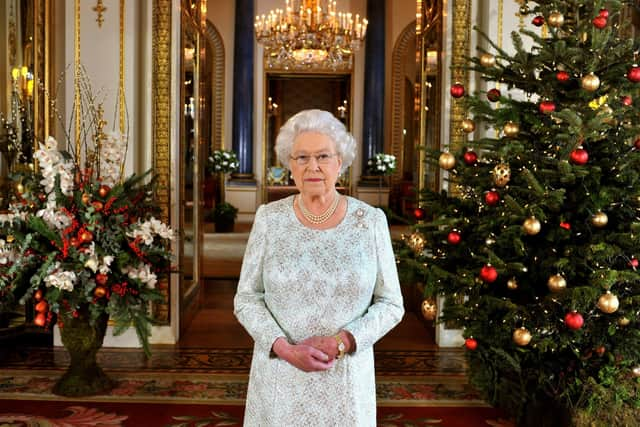The Queen was constant in both religious and non-religious households - Arun Arora, Bishop of Kirkstall
There was no talk about the celebration of God entering human history in the person of Jesus Christ or particular marking of the baby born into poverty in a manger who would ultimately triumph over sin and death. Rather it was about two other people: James Bond and the Queen.
In our home in Birmingham the order of service for Christmas Day was set around the Queen's Christmas Day message. We would gather around the television just before 3pm, shushing one another as the image of Buckingham Palace came on to the screen and we listened in silence to Her Majesty. Christmas lunch would follow, often in front of the telly, tuned in to whatever James Bond film was being shown that Christmas Day – not so much Gold, Frankincense and Myrrh but The Man with the Golden Gun. That combination of Queen Elizabeth and James Bond was of course to combine again in 2012 as the most memorable part of the opening of the London Olympics.
Advertisement
Hide AdAdvertisement
Hide AdIn the years and decades that followed, especially since the turn of the Millennium, the Queen would often use those Christmas messages to reflect on her own faith. She was an Evangelist but not in any strident way. Gently and assuredly she spoke of the way her faith shaped and moulded her.


But it was not only her own faith. During the celebrations for her Diamond Jubilee in 2012, Her Majesty addressed faith leaders at Lambeth Palace where she noted how many of the values and ideas we take for granted originate in the ancient wisdom of religious tradition.
She also spoke of the role of the Church of England.
“The concept of our established Church is occasionally misunderstood and, I believe, commonly under-appreciated,” she said. “Its role is not to defend Anglicanism to the exclusion of other religions. Instead, the Church has a duty to protect the free practice of all faiths in this country. It certainly provides an identity and spiritual dimension for its own many adherents. But also, gently and assuredly, the Church of England has created an environment for other faith communities and indeed people of no faith to live freely.”
It is in that spirit that this Sunday evening on the steps of the civic hall people of faith in Leeds will gather, on the eve of the funeral, to pray together and to mourn together, united in grief for this defender of faith.
Advertisement
Hide AdAdvertisement
Hide AdYet it is also worth acknowledging the uncomfortable truth that the Queen reigned over peoples, both here and abroad, who did not universally support her role as both monarch and head of state.
Over recent years our nation has suffered various societal divisions whether on the Brexit and independence referendums, culture wars and disputes. Yet in her death the Queen has demonstrated again, as she did in her life, her capacity to unite realms and nations, to act as a reconciling force and point of unity.
It has been suggested by some that Britain’s colonial past, a time when the Queen reigned, somehow makes her directly complicit in some of the atrocities or maltreatment meted out in the name of empire. I think such criticism is wide of the mark. Yes the echoes of empire continue to reverberate, not least in some of its systemic injustices. But no one person, and certainly not this person whom we come to honour, can be held responsible entirely for the sins arising from the occupation of another land.
And whilst it is entirely possible that my great grandfathers may have thrown stones at the windows of colonial buildings in protest at the yoke of colonialism, we, the grandchildren and great grandchildren of the Empire are now free. Free to give thanks for Queen Elizabeth, free to mourn her passing, free to pray for King Charles, his heirs and successors, to pledge our allegiance – not because we have to or are forced to. But because we choose to, recognising that the past is a different country, they do things differently there.
Advertisement
Hide AdAdvertisement
Hide AdFor both prince and pauper, queen and courtier, our common humanity is shared not only in the first breath of life but also in its end. Death is the great leveller. But death does not have the final word.
Queen Elizabeth knew, ultimately, where her end lay. Not simply in a coffin draped with the Royal Standard, nor buried in the grounds of Windsor castle. But in the sure and certain promise of the resurrection promised by her Lord and Saviour who triumphed over sin and death. In whose life, death and resurrection the love of God has the last word.
May light perpetual shine upon her and may she rest in peace and rise in glory.
An excerpt of the sermon preached by The Rt Revd Arun Arora, Bishop of Kirkstall, at Leeds Minster as part of a Memorial Service for Her Majesty Queen Elizabeth II.